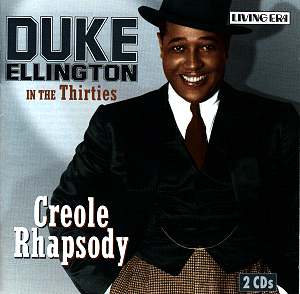CD 1
1. Jungle Nights in Harlem
2. Jungle Blues
3. Ring Dem Bells
4. Mood Indigo (Dreamy Blues)
5. Rockin' In Rhythm
6. Creole Rhapsody
7. Echoes Of The Jungle
8. It Don't Mean a Thing if it Ain't Got That
Swing
9. Lazy Rhapsody (Swannee River Rhapsody)
10. Blue Harlem
11. Swampy River
12. Blue Ramble
13. Lightnin'
14. Sophisticated Lady
15. Drop Me Off at Harlem
16. Bundle Of Blues (Dragon Blues)
17. Harlem Speaks
18. Dear Old Southland
19. Daybreak Express
20. Stompy Jones
21. Solitude
22. Saddest Tale
23. Merry-Go-Round (Harlem Rhythm)
CD 2
1. In a Sentimental Mood
2. Showboat Shuffle
3. Reminiscing in Tempo
4. Oh, Babe! Maybe Someday
5. Clarinet Lament (Barney's Concerto)
6. Echoes of Harlem (Cootie's Concerto)
7. Trumpet in Spades (Rex's Concerto)
8. Yearning For Love (Lawrence's Concerto)
9. In a Jam
10. Uptown Downbeat (Black Out)
11. Caravan
12. Diminuendo and Crescendo in Blue
13. Harmony in Harlem
14. Ridin' on a Blue Note
15. The Gal from Joe's
16. I Let a Song Go Out of my Heart
17. Rose of the Rio Grande
18. Prelude to a Kiss
19. Battle of Swing (Le Jazz Hot)
20. Blue Light (Transblucency)
21. Grievin'
Collective personnel
Duke Ellington – Piano
Arthur Whetsol, Cootie Williams, Freddie Jenkins,
Charlie Allen, Wallace Jones, Harold Baker –
Trumpets
Louis Bacon – Trumpet, vocals
Rex Stewart – Cornet
Tricky Sam Nanton, Lawrence Brown, Herb Fleming
– Trombones
Juan Tizol – Valve trombone
Barney Bigard – Clarinet, tenor sax
Johnny Hodges – Alto sax, soprano sax, clarinet
Otto Hardwick – Alto sax, bass sax, clarinet
Harry Carney – Baritone sax, clarinet, alto
sax
Pete Clark – Alto sax
Ben Webster – Tenor sax
Fred Guy – Banjo, guitar
Wellman Braud, Hayes Alvis, Billy Taylor - Bass,
Sonny Greer, Fred Avendorf - Drums
Ivie Anderson – Vocals
On
this website, I am already on record as describing
Duke Ellington as the greatest jazz musician
ever, and this double CD gives me no cause
to retract that statement. All the tracks
here were recorded in the 1930s, when Ellington’s
band had built up the experience of a long
residency at the Cotton Club and the personnel
had stabilised with such great names as Cootie
Williams, Tricky Sam Nanton, Johnny Hodges,
Harry Carney and Sonny Greer. Indeed, the
fourth track on this set – Mood Indigo
(originally called "Dreamy Blues")
– was a big hit for Ellington (he claimed
he composed it while his mother was cooking
dinner!).
The
track listing confirms Duke’s richness of
achievement in the thirties, pouring out enduring
melodies like Sophisticated Lady, Solitude
and Prelude to a Kiss in remarkable
profusion. The 44 tracks here represent only
a sample of the marvellous recordings he made
during this period, and the selection omits
many worthy items like Cotton Club Stomp,
Creole Love Call and Azure.
The
album’s title reminds us of another of his
achievements: as one of the pioneers of extended
jazz compositions. When his agent, Irving
Mills, suggested that Ellington should write
a "rhapsody", the Duke came up with
Creole Rhapsody, a piece which stretched
over two sides of a 78-rpm disc, including
key changes, piano interludes and an unusually
structured blues chorus. The album also contains
Reminiscing in Tempo, a 12-minute masterpiece
written by the Duke in memory of his mother,
expressing his sadness at her death as well
as his happy memories of her. And there is
the enterprising Diminuendo and Crescendo
in Blue, clocking in at nearly six minutes
and foreshadowing the revival of Duke’s career
when it was reconstructed in a heroic marathon
version at the 1956 Newport Jazz Festival.
This
collection traces Duke’s development from
the "jungle style" which characterised
some of the band’s early recordings to the
increasing maturity and sophistication of
tracks like Saddest Tale and Blue
Light. In fact Ellington seldom stayed
still, continually developing his style and
hardly ever following the fashionable flow.
After all, the 1930s were the "swing
era" but Duke never tried to emulate
the (admittedly more popular) styles of Benny
Goodman or Artie Shaw.
Ellington’s
individuality as a composer matched his unsurpassed
ability to recruit musicians with unique voices
and let them express their special qualities.
This is particularly evident in the "concertos"
which he wrote for four of his soloists. Clarinet
Lament spotlights the supreme talent
of clarinettist Barney Bigard, while Echoes
of Harlem is not the only concerto that
Duke wrote for Cootie Williams (Concerto
for Cootie followed in 1940). Trumpet
in Spades was a possibly mis-named feature
for cornettist Rex Stewart but it displays
his eccentric ability to set off musical firework
displays, while Lawrence Brown makes his trombone
sing lyrically in Yearning for Love.
Lawrence is also featured on Rose of the
Rio Grande, which has attractive vocals
by Ivie Anderson, one of Duke’s most endearing
singers.
There
have been many compilations of Ellington material,
some more generous – like Proper Records’
four-CD box covering 1926 to 1949. But there
are enough masterly performances on these
two CDs to keep any listener busy for weeks.
Tony Augarde
